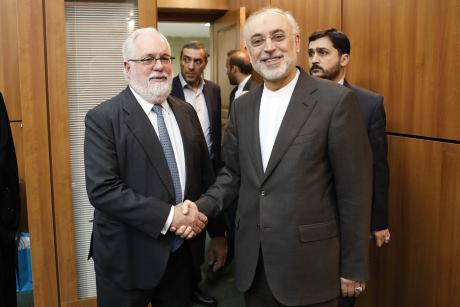The European Commission and the Atomic Energy Organisation of Iran (AEOI) have confirmed their continuing commitment towards implementation of the Joint Comprehensive Plan of Action (JCPOA), following a visit by European commissioner for climate action and energy Miguel Arias Cañete to Tehran.
 |
| Miguel Arias Cañete and Ali Akbar Salehi meet in Tehran (Image: European Union/EC-Audiovisual Service) |
"We met today to confirm the continuing commitment of the European Commission and the Atomic Energy Organisation of Iran towards the implementation of the Joint Comprehensive Plan of Action, and in particular its Annex III which addresses civil nuclear cooperation," Cañete and Ali Akhbar Salehi, president of the AEOI, said in a joint statement on 19 May. "We believe that the continuing implementation of the JCPOA, which was unanimously endorsed by UN Security Council Resolution 2231, is crucial for the development and progress of the region as well as the global peace and security."
"The JCPOA represents the fruit of more than a decade of successful multilateral diplomacy which signifies the imperative of peaceful settlement of dispute and is a key element of the global nuclear non-proliferation architecture," they said. The statement notes that the International Atomic Energy Agency - which is responsible for verifying and monitoring Iran's implementation of its nuclear commitments under the plan - has so far confirmed in ten successive reports that Iran has implemented those commitments. "[F]or its part, the European Union will remain committed to the continued full and effective implementation of the JCPOA, as long as Iran continues to implement its nuclear related commitments," the statement adds.
Since the JCPOA was implemented in January 2016, the European Commission and the AEOI have issued a joint statement on cooperation in the field of nuclear energy setting out guidelines for cooperation in the implementation of Annex III, they note. The two bodies have also held high-level seminars on nuclear cooperation and governance in Brussels and in Isfahan, and adopted a roadmap detailing future cooperation in the field of nuclear R&D. The European Commission has opened up its nuclear research programme for Iranian participation, and exchanges and visits of nuclear scientists have already taken place.
Ongoing projects between the two bodies address nuclear safety cooperation including: a project for stress testing of Iran's first nuclear power plant, Bushehr 1; a project to prepare for the establishment of a nuclear safety centre in Iran, and projects to enhance the capabilities of Iran's Nuclear Regulatory Authority.
The European Commission and the AEOI have also deepened working level contacts aimed at bringing nuclear safety specialists of the both sides together: Iranian specialists have participated in the bi-annual conference of European Union nuclear safety regulator's group ENSREG and have also participated in the peer review of the stress test of a reactor under construction. Iranian specialists also were invited to the launch of the EU's Samira project on non-power applications of nuclear energy and nuclear technology, and Iran and the EU are currently preparing a technical seminar on the issue of third-party nuclear liability and insurance, they said.
"The European Commission is also strongly supporting Iran's endeavours in governing the safe and responsible use of nuclear energy, including accession to the relevant international conventions," the statement notes.
"We welcome the strengthening of ties at all levels and look forward to their further development over the coming months and years."
A third high level seminar on nuclear cooperation will take place in Brussels at the end of November 2018.
US President Donald Trump on 8 May announced the termination of the USA's participation in the JCPOA, directing the US administration to begin the process of re-imposing sanctions on Iran.
Researched and written
by World Nuclear News




_18570.jpg)
_18938.jpg)
_33584.jpg)
_82983.jpg)





